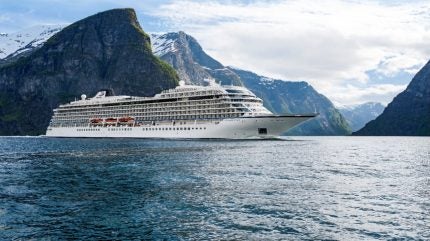
Viking and Fincantieri have revealed details of Viking Libra and Astrea, sister vessels that will be the world’s first hydrogen-powered cruise ships.
Currently under construction at Fincantieri’s Ancona shipyard, the Viking Libra is expected to be delivered in late 2026. The Astrea is scheduled for delivery in 2027.
The Libra, classified as a small ship (the same as the entire Viking fleet), will have a gross tonnage of approximately 54,300t and will feature 499 staterooms, accommodating up to 998 guests. The company has not confirmed which routes the vessels will operate on, but explained they would join its ocean fleet.
This ship’s propulsion system will run on liquefied hydrogen in fuel cells, enabling it to navigate without emissions and access environmentally sensitive regions.
The advanced propulsion technology, developed by Isotta Fraschini Motori, a subsidiary of Fincantieri, will generate up to 6MW of power.
Viking chairman and CEO Torstein Hagen said: “Viking made the principled decision to invest in hydrogen, which offers a true zero-emission solution. We look forward to welcoming the world’s first hydrogen-powered cruise ship to our fleet in 2026.”

US Tariffs are shifting - will you react or anticipate?
Don’t let policy changes catch you off guard. Stay proactive with real-time data and expert analysis.
By GlobalDataViking and Fincantieri have also signed contracts for two additional ocean ships, set for delivery in 2031, along with an option for two more ships in 2033.
The company said it anticipated “taking delivery of 26 river ships by 2028 and 11 ocean ships by 2031, which will increase its fleet to 110 river ships and 23 ocean and expedition ships by 2031.”
Fincantieri CEO and managing director Pierroberto Folgiero said: “With the Viking Libra, we are not only delivering the world’s first cruise ship powered by hydrogen stored on board, but we are also reinforcing our commitment to shaping the future of sustainable maritime transportation.”
Italy’s Eni, Fincantieri, and RINA have launched a study to aid the decarbonisation of maritime transport.



